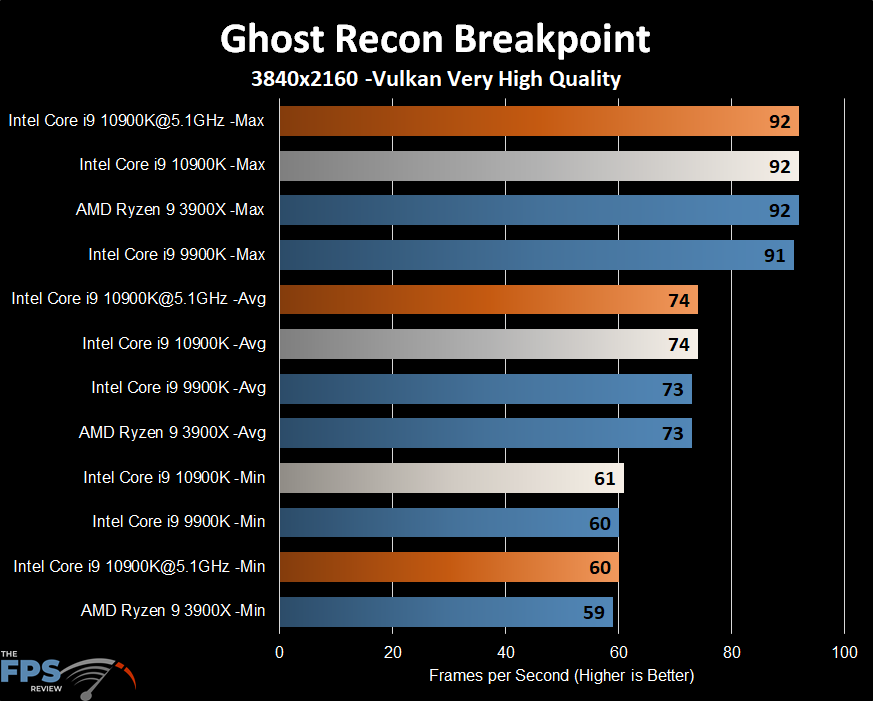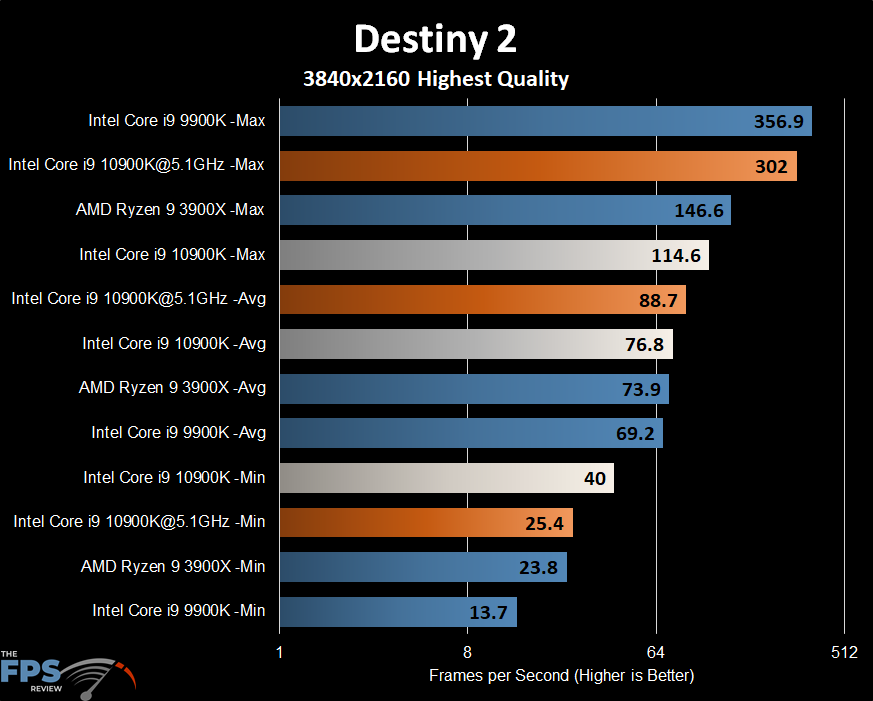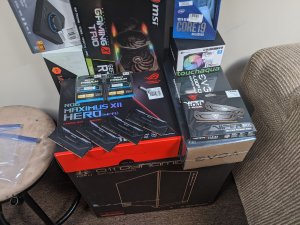It isn't as simple as saying AMD is 10FPS slower in games than Intel's Core i9-10900K is. In some games, you won't see that much of a difference and in others you might see considerably more. You have to look at the resolution, settings and games you play and determine whether or not the upgrade makes sense on any level right now. In my test, it was pretty simple. In games where you are CPU limited, Intel has a pretty big advantage. The problem is, that "big advantage" isn't necessarily something you can leverage or something that matters. That is to say, games like Destiny 2, Doom Eternal and others that run extremely fast anyway show bigger gains on Intel. Unless your looking to hit specific frame rates such as those needed for high refresh rate monitors the difference is for the most part functionally academic. If you've got a 120Hz or 144Hz monitor and an RTX 2080 Ti. You can do anything upwards of 3440x1440 without noticing any difference between the two despite the Core i9-10900K being faster according to the numbers.
In many cases, even at 4K the numbers weren't all that far apart. Naturally, the more the GPU becomes a factor the less pronounced the difference is. Ghost Recon Breakpoint is pretty demanding and I can't always hit 120FPS @ 3440x1440. In cases like that, at 4K, we literally saw a 1-3FPS difference between AMD's Ryzen 9 3900X and Intel's Core i9-10900K across the board.

It's worth noting that in some cases, the Core i9-10900K saw massive increases from overclocking. Something the CPU generally does well, but is a pain to keep cool. It pulls a ton of power to do it and though the gains are there, many people probably won't want to invest in the cooling hardware to achieve those results.
Outside of gaming is where things fall apart for Intel. However, most people don't really do the types of things with their systems that really benefit from the massive increases we've had in CPU cores in the last two years or so. The fact is, software hasn't really caught up to those increases yet and probably won't for years. That assumes the application can even benefit from additional parallel processing in the first place. Some simply can't benefit from that. Again, while AMD is clearly the winner in anything multi-threaded, the difference for most people is largely academic. This is a "buy whatever" you want type of situation. You have to have pretty specific use cases for someone to say with certainty that AMD will really benefit you over what Intel offers. If you aren't doing a ton of video editing and encoding, or a ton of virtualization work I'd largely say that either option would generally work about the same.
That said, right now the value option certainly rests with AMD. With recent price cuts to the Ryzen 9 3900X it's a no brainer vs. Intel unless all you do with your PC is play games. Even then, not everyone is going to see the frame rate differences as being worth the extra $150 or so it costs to go Intel. Z490 boards are largely expensive, but then again so are the decent X570 boards. Although, again with AMD you have a wider range of price points you can find motherboards at. Many X470 motherboards are good options and certainly lessen the cost of doing a build. Money that could go to a GPU or a cooling upgrade if you already have a good GPU or want to hold off until later this year when NVIDIA drops its successor to the RTX 2080 Ti.
In many cases, even at 4K the numbers weren't all that far apart. Naturally, the more the GPU becomes a factor the less pronounced the difference is. Ghost Recon Breakpoint is pretty demanding and I can't always hit 120FPS @ 3440x1440. In cases like that, at 4K, we literally saw a 1-3FPS difference between AMD's Ryzen 9 3900X and Intel's Core i9-10900K across the board.

It's worth noting that in some cases, the Core i9-10900K saw massive increases from overclocking. Something the CPU generally does well, but is a pain to keep cool. It pulls a ton of power to do it and though the gains are there, many people probably won't want to invest in the cooling hardware to achieve those results.
Outside of gaming is where things fall apart for Intel. However, most people don't really do the types of things with their systems that really benefit from the massive increases we've had in CPU cores in the last two years or so. The fact is, software hasn't really caught up to those increases yet and probably won't for years. That assumes the application can even benefit from additional parallel processing in the first place. Some simply can't benefit from that. Again, while AMD is clearly the winner in anything multi-threaded, the difference for most people is largely academic. This is a "buy whatever" you want type of situation. You have to have pretty specific use cases for someone to say with certainty that AMD will really benefit you over what Intel offers. If you aren't doing a ton of video editing and encoding, or a ton of virtualization work I'd largely say that either option would generally work about the same.
That said, right now the value option certainly rests with AMD. With recent price cuts to the Ryzen 9 3900X it's a no brainer vs. Intel unless all you do with your PC is play games. Even then, not everyone is going to see the frame rate differences as being worth the extra $150 or so it costs to go Intel. Z490 boards are largely expensive, but then again so are the decent X570 boards. Although, again with AMD you have a wider range of price points you can find motherboards at. Many X470 motherboards are good options and certainly lessen the cost of doing a build. Money that could go to a GPU or a cooling upgrade if you already have a good GPU or want to hold off until later this year when NVIDIA drops its successor to the RTX 2080 Ti.
![[H]ard|Forum](/styles/hardforum/xenforo/logo_dark.png)

